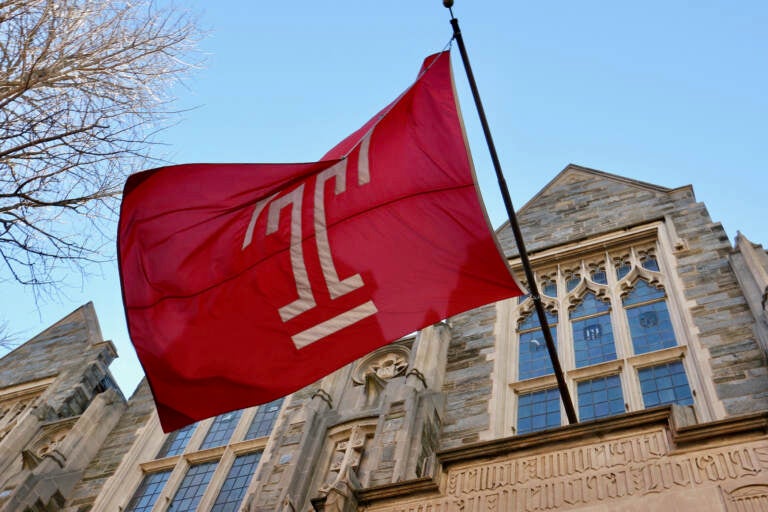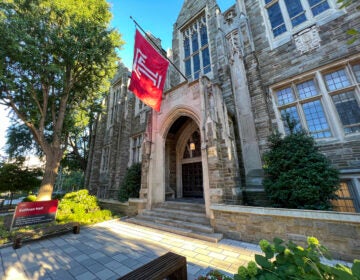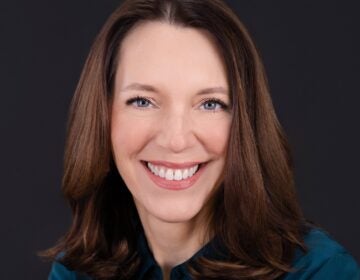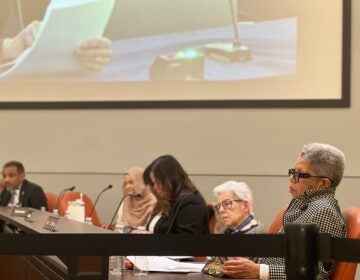Temple University close to naming next president after tumultuous decade
Temple officials announced that they have narrowed down their list of applicants, but have yet to disclose the names to faculty.
Listen 1:31
A flag flies on Temple University's Sullivan Hall. (Emma Lee/WHYY)
From Philly and the Pa. suburbs to South Jersey and Delaware, what would you like WHYY News to cover? Let us know!
Amid growing criticism from the school’s faculty union over its presidential search process, Temple University officials shed new light on their pursuit of a new leader.
University officials announced last Monday that a decision on the school’s next president was near. The school’s search committee narrowed the list of applicants down to a roster of “highly qualified individuals,” according to a press release. However, the list of candidates for Temple’s presidency remains a secret, despite calls from faculty to release the potential presidents’ names.
Temple began struggling with its presidential role in 2012, when the school’s first female president, Ann Weaver Hart, resigned to move west and lead the University of Arizona. Hart’s replacement, former Indiana University CFO Neil Theobald, lasted four years before he resigned after a deficit in the school’s financial aid budget led to a no-confidence vote.
The board appointed an interim president, chancellor Richard Englert, to oversee university operations during the search for a replacement. Englert, however, lasted so long in the position that Temple eventually removed the “interim” label altogether. In 2021, the search ended when Jason Wingard was hired. Yet, Wingard resigned the presidency last spring after two off-campus killings and a graduate students’ strike that drew coverage from the national press and unfavorable eyeballs from Washington. Wingard’s temporary replacement, the legal scholar JoAnne Epps, died after collapsing on stage at an event last September, prompting trustees to elevate Englert to the top job again.
Given the tumultuous nature of the last decade, the university set out to try something different this time.
Mitchell Morgan, the chairman of Temple’s board of trustees, said the university wanted to pursue a different path than the one that led to its previous presidents. So, those in charge of the search shed any preconceptions about who should lead the university.
“We didn’t have any thought about what the next president should look like,” Morgan said. “And that’s why we spent more time than ever on doing a listening tour of our stakeholders, and hired a third-party consulting firm that helped us with that.”
Faculty senate president Shohreh Amini, a biology professor and member of the search committee, expressed happiness with this year’s process.
“Chairman Morgan came several times — specifically asked faculty what they are looking for in their next president,” Amini said. “He listened. He even asked for names.” Amini added that none of her colleagues “had ever seen such a thing before.”
But Jeffrey Doshna, the president of the Temple Association of University Professionals, a union representing faculty, doubted that the current presidential search process was all that different. Doshna, who teaches urban planning at Temple’s Tyler School of Art and Architecture, pointed to a lack of transparency — specifically, the committee’s decision to keep its list of candidates private.
“I’ve been a candidate for job searches before where the initial round of folks is kept quiet, because you don’t necessarily want your boss to know that you’re looking for a job; I understand that,” Doshna said. “But if they truly are throwing out the book and doing this a different way, they shouldn’t revert back to the old practices, which include this kind of rigid insistence on keeping that list quiet.”
Doshna further criticized the search process for the absence of North Philadelphia residents on the committee — though Morgan pointed to his meetings with community leaders, including state Sen. Sharif Street, as evidence of Temple’s commitment to considering its mostly-Black neighbors’ concerns throughout the search.
No matter who the university names to the presidency, two of the school’s current officers seem almost certain to remain: Morgan and provost Gregory R. Mandel. TAUP condemned both men in a no-confidence vote after last spring’s strike, with 81 percent of Temple’s faculty declaring they had lost faith in the two officials.
The university says it’s set to announce a new president by the end of the spring.

Get daily updates from WHYY News!
WHYY is your source for fact-based, in-depth journalism and information. As a nonprofit organization, we rely on financial support from readers like you. Please give today.






